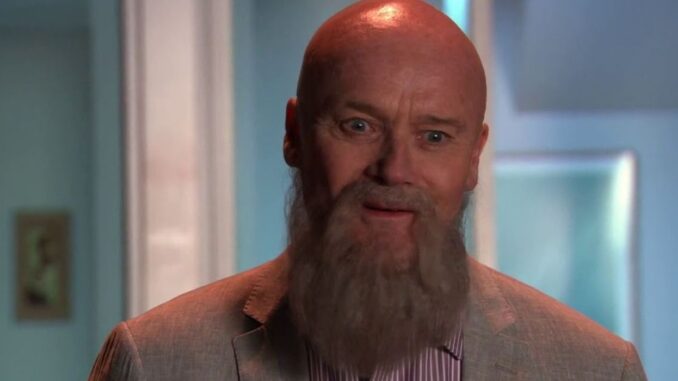
From Lizard King to Silent Farewell: The Bookends of Creed Bratton's Confessional
Creed Bratton, the enigmatic quality assurance manager of Dunder Mifflin Scranton, operates on a plane all his own. He’s a walking paradox, a man seemingly oblivious to social norms, legal boundaries, and the basic tenets of coherent conversation. Throughout the documentary, he’s a source of endless bewilderment and bizarre humor, often glimpsed lurking in the background or offering snippets of unsettling wisdom. But two moments, specifically his first and last confessions to the camera, stand out as particularly revealing, encapsulating the full spectrum of his eccentric character: from unhinged self-assuredness to a chilling silence.
Creed's very first confession, early in the series, is a masterclass in deceptive normalcy. He sits in the interview chair, a picture of (relative) composure. He even attempts a charming smile. “I enjoy working at Dunder Mifflin,” he states with a sincerity that momentarily disarms. He then proceeds to launch into a rambling justification for his work ethic: “I love paper. There's nothing better than fresh, white paper. You can do anything with it. You could read, or… I don't know. I write.” It's the innocent preamble that lures the viewer in. Then comes the hammer blow, delivered with casual confidence: "I am 30. Well, in November I'll be 30." The age he reveals is patently absurd, a transparent lie that cracks the veneer of respectability he so briefly cultivated.
This initial confession is a perfect encapsulation of Creed's persona. He craves acceptance, evidenced by his attempt at appearing “normal,” but his inherent eccentricities, his casual disregard for truth, invariably seep through. He wants to belong, to be seen as just another employee, but he simply can’t help but be…Creed. This scene also hints at the darker undercurrents that run beneath his seemingly harmless absurdity. He's not just quirky; he's secretive, potentially dishonest, and lives a life disconnected from reality, hinted at by the casual fabrication of his age. He's the Lizard King, desperately trying to blend in with the chameleons.
Compare this initial bluster with Creed’s final appearance in the documentary. It’s the culmination of nine seasons of bizarre behavior, escalating oddities, and increasingly suspicious actions. His past, hinted at in fragments throughout the series – the drug use, the criminal activities, the aliases – finally catches up to him. In the series finale, as the documentary crew prepares to wrap up, the police arrive at Dunder Mifflin, and Creed, with a weary resignation, is led away in handcuffs.
The scene is punctuated by the typical talking head interviews of the other characters, reflecting on their time at the company, their friendships, and their futures. The camera then cuts to the interview room. The chair sits empty. It's a stark, silent image. Creed is gone, his voice silenced, his fate uncertain.
This absence speaks volumes. After years of bizarre pronouncements, unsettling confessions, and outright lies, Creed's final statement is a profound silence. It's a silence that amplifies the mysteries surrounding him. Has he finally been caught for his past transgressions? Is he going to jail? Will he ever reveal the truth about his real identity, his past, his motivations? The ambiguity is unsettling, a reminder that beneath the comedic façade of Creed Bratton lurked a character shrouded in shadow and secrets.
The contrast between these two confessions is striking. In the beginning, Creed seeks to project an image, however flawed, of normalcy and integration. He actively participates in the documentary, albeit with his characteristic quirks. In the end, he’s rendered speechless, stripped of agency, his narrative abruptly cut short. The camera lingers on an empty chair, a testament to the unresolved questions and the lingering unease that Creed leaves behind.
Creed's first and last confessions are not just bookends to his story; they are the key to understanding his character. They highlight the desperate desire to fit in alongside the profound inability to conform, the innocent facade concealing the unsettling depths. His journey from the confidently delusional “30-year-old” to the silent, arrested man paints a complex portrait of a character who, despite his comedic brilliance, remains one of the most enigmatic figures in the Dunder Mifflin universe, leaving viewers to ponder the mysteries of Creed Bratton long after the documentary crew packs up their cameras.